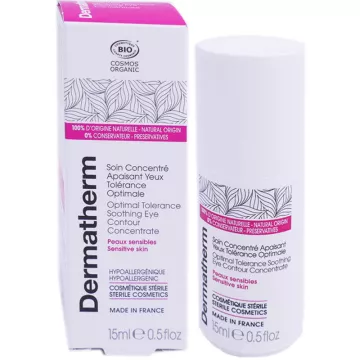
What is sensitive skin?
Sensitive skin is a type of skin that overreacts to stimuli that don't usually bother other skin types. Common signs include tingling, burning, redness or irritation. This type of skin requires special attention and care to minimize adverse reactions and maintain its integrity.
What causes skin sensitivity?
Skin sensitivity can be caused by a variety of factors, both internal and external. Internal causes include genetic factors and hormonal imbalances. External causes include environmental factors such as pollutants, climatic variations and excessive exposure to the sun. The use of unsuitable cosmetics or products containing irritating substances can also exacerbate skin sensitivity.
How to identify products suitable for sensitive skin?
Choosing the right products for sensitive skin is crucial. Look for products labelled "hypoallergenic", "fragrance-free" and "non-comedogenic". It's important to favor simple formulations, with few active ingredients. Performing a skin test prior to the full use of a new product can help prevent negative reactions.
What ingredients should I avoid if I have sensitive skin?
If you have sensitive skin, avoid ingredients known to be irritating. This includes alcohol, synthetic fragrances, colorants, and certain preservatives such as parabens. Strong acids, such as glycolic acid and salicylic acid, can also be too aggressive for this skin type.
What skincare routine should I adopt for sensitive skin?
A skincare routine for sensitive skin should be gentle and minimize the risk of reactions. Start with a gentle cleanser, followed by a light but effective moisturizer. Daily use of a suitable sunscreen is imperative to protect the skin from harmful UV rays. It is advisable to avoid mechanical exfoliation, preferring gentler methods if necessary.
How can I protect sensitive skin from external aggression?
Protecting sensitive skin means minimizing exposure to irritating factors. Wear protective clothing and use physical barriers such as mineral sunscreens when outdoors. Indoors, the use of a humidifier can help maintain skin hydration, especially in winter.
Are there specific treatments for sensitive skin?
For extremely sensitive skin, specific treatments may be recommended by a dermatologist. These may include prescription creams to reinforce the skin barrier or treat specific symptoms such as eczema or rosacea. A dermatological consultation is often beneficial in establishing a safe, personalized skin care plan.
How can I tell the difference between sensitive skin and an allergic reaction?
It's important to distinguish between naturally sensitive skin and an allergic reaction. Sensitive skin generally reacts consistently to various irritants, while an allergic reaction is often more severe and localized, occurring in response to specific contact with an allergen. Symptoms of an allergic reaction include intense itching, rash, blistering or swelling. If in doubt, consult a dermatologist for appropriate testing and accurate diagnosis.
What dermatological tests are recommended for sensitive skin?
For people with sensitive skin, certain dermatological tests may be suggested by a healthcare professional to better understand the specifics of their skin. The most common tests include the patch test, which helps identify contact allergies, and the skin sensitivity scale test, which assesses the skin's reaction to different irritants. These tests help to personalize skin care and select more appropriate products.
Can dietary changes influence the health of sensitive skin?
Yes, dietary habits can have a significant impact on the health of sensitive skin. Certain foods, such as dairy products, sugar-rich foods and certain food additives, can exacerbate inflammation and skin sensitivities. A diet rich in fresh fruit and vegetables, omega-3 fatty acids and antioxidants is recommended to help strengthen the skin barrier and reduce inflammation.
Can essential oils be used on sensitive skin?
The use of essential oils on sensitive skin should be approached with caution. While some oils, such as chamomile and lavender, are renowned for their soothing properties, they can also be potentially irritating to sensitive skin. It is essential to dilute essential oils with a carrier oil, such as jojoba or sweet almond oil, and to carry out a skin test before regular application.
What role does the microbiome play in the health of sensitive skin?
The cutaneous microbiome, the set of micro-organisms present on the skin, plays a crucial role in protecting against pathogens and regulating inflammatory reactions. An imbalance in the microbiome can contribute to increased skin sensitivity and dermatological problems such as eczema. Maintaining a healthy microbiome can be facilitated by the use of adapted, non-aggressive products and a gentle skincare routine that respects the skin's natural balance.